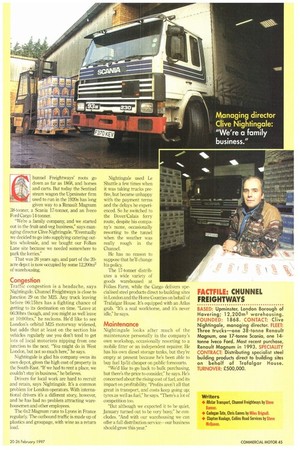hunnel Freightways' roots go down as far as 1868, and
Page 47

If you've noticed an error in this article please click here to report it so we can fix it.
horses and carts. But today the Sentinel steam wagon the Upminster firm used to run in the 1920s has long given way to a Renault Magnum 38-tonner, a Scania 17-tonner, and an Iveco Ford Cargo 14-tonner.
"We're a family company, and we started out in the fruit-and-veg business," says managing director Clive Nightingale. "Eventually we decided to go into supplying catering outlets wholesale, and we bought our Folkes Lane site because we needed somewhere to park the lorries."
That was 26 years ago, and part of the 20acre depot is now occupied by some 12,200m2 of warehousing.
Congestion
Traffic congestion is a headache, says Nightingale. Chunnel Freightways is close to Junction 29 on the M25. Any truck leaving before 06:15hrs has a fighting chance of getting to its destination on time. "Leave at 06:30hrs though, and you might as well leave at 10:00hrs," he reckons. He'd like to see London's orbital M25 motorway widened, but adds that at least on the section his vehicles regularly use you don't tend to get lots of local motorists nipping from one junction to the next. "You might do in West London, but not so much here," he says.
Nightingale is glad his company owns its own depot, given the high cost of property in the South-East. "If we had to rent a place, we couldn't stay in business," he believes.
Drivers for local work are hard to recruit and retain, says Nightingale. It's a common problem for London operators. With international drivers its a different story, however, and he has had no problem attracting warehousemen and other employees.
The 6x2 Magnum runs to Lyons in France regularly. The outbound traffic is made up of plastics and groupage, with wine as a return load. Nightingale used Le Shuttle a few times when it was taking trucks prefire, but became unhappy with the payment terms and the delays he experienced. So he switched to the Dover/Calais ferry route, despite his company's name, occasionally resorting to the tunnel when the weather was really rough in the Channel.
He has no reason to suppose that he'll change his policy.
The 17-tonner distributes a wide variety of goods warehoused at Folkes Farm, while the Cargo delivers specialised steel products direct to building sites in London and the Home Counties on behalf of Trafalgar House. It's equipped with an Atlas grab. "It's a real workhorse, and it's never idle," he says.
Maintenance
Nightingale looks after much of the maintenance personally in the company's own workshop, occasionally resorting to a mobile fitter or an independent repairer. He has his own diesel storage tanks, but they're empty at present because he's been able to buy fuel lp/lit cheaper on public forecourts.
"We'd like to go back to bulk purchasing, but there's the price to consider," he says. He concerned about the rising cost of fuel, and its impact on profitability. "Profits aren't all that great in transport, and costs keep going up; tyres as well as fuel," he says. "There's a lot of competition too.
"But although we expected it to be quiet. January turned out to be very busy," he concludes. "And with our warehousing we can offer a full distribution service—our business should grow this year."


























































































































